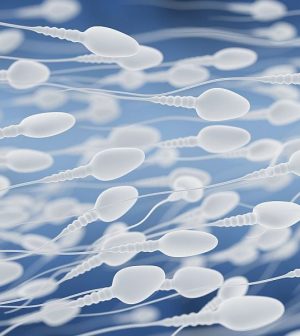- Could Your Grocery Store Meat Be Causing Recurring UTIs?
- Are You Making This Expensive Thermostat Error This Winter?
- Recognizing the Signs of Hypothyroidism
- 10 Strategies to Overcome Insomnia
- Could Artificial Sweeteners Be Aging the Brain Faster?
- Techniques for Soothing Your Nervous System
- Does the Water in Your House Smell Funny? Here’s Why
- Can a Daily Dose of Apple Cider Vinegar Actually Aid Weight Loss?
- 6 Health Beverages That Can Actually Spike Your Blood Sugar
- Treatment Options for Social Anxiety Disorder
Semen Has a Microbiome Too, and It Might Affect Fertility

Microbiomes: You’ve probably heard of these communities of largely helpful bacteria that colonize the gut or the skin.
But a man’s semen has a microbiome of its own, and new research suggests it could play a role in fertility.
Researchers at the University of California Los Angeles examined the microbiomes and sperm health of 73 adult men. Some had been having issues with fertility while others had no fertility issues and had already become fathers.
The study turned up one species of bacterium living within semen, Lactobacillus iner, that could play a role in fertility.
As the researchers explained, this bacterium produces L-lactic acid, which in turn can trigger inflammation within semen and potentially impair the movement of sperm.
They noted that prior research has already implicated Lactobacillus iner in fertility issues among women, because it’s also found within the vaginal microbiome.
Three microbes in the Pseudomonas class of bacteria were also found in semen and might play a role in sperm concentrations.
Among men with abnormal sperm concentrations, Pseudomonas fluorescens and Pseudomonas stutzeri appeared to be more common, while Pseudomonas putida was less common, the investigators said.
The impact of bacteria on fertility, even when those bacteria are closely related, appears to differ widely between species, said the team led by Dr. Vadim Osadchiy.
“There is much more to explore regarding the microbiome and its connection to male infertility,” said Osadchiy, a resident in the department of urology at UCLA.
“However, these findings provide valuable insights that can lead us in the right direction for a deeper understanding of this correlation,” he added in a university news release. “Our research aligns with evidence from smaller studies and will pave the way for future, more comprehensive investigations to unravel the complex relationship between the semen microbiome and fertility.”
The study was recently published in Scientific Reports.
More information
Find out more about male fertility at the Mayo Clinic.
SOURCE: University of California Los Angeles, news release, Jan. 18, 2024
Source: HealthDay
Copyright © 2026 HealthDay. All rights reserved.










